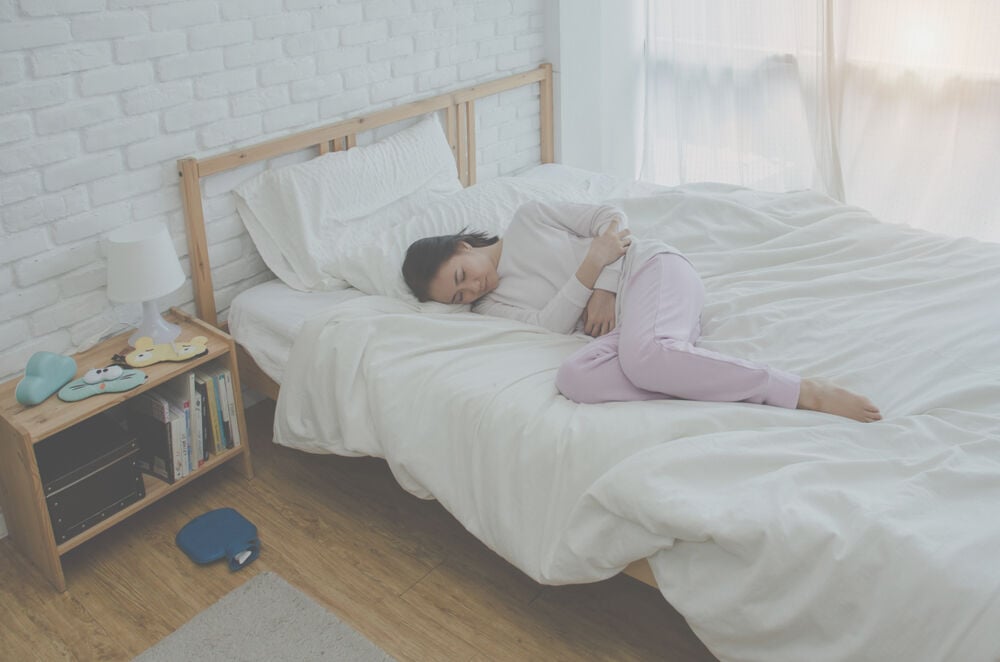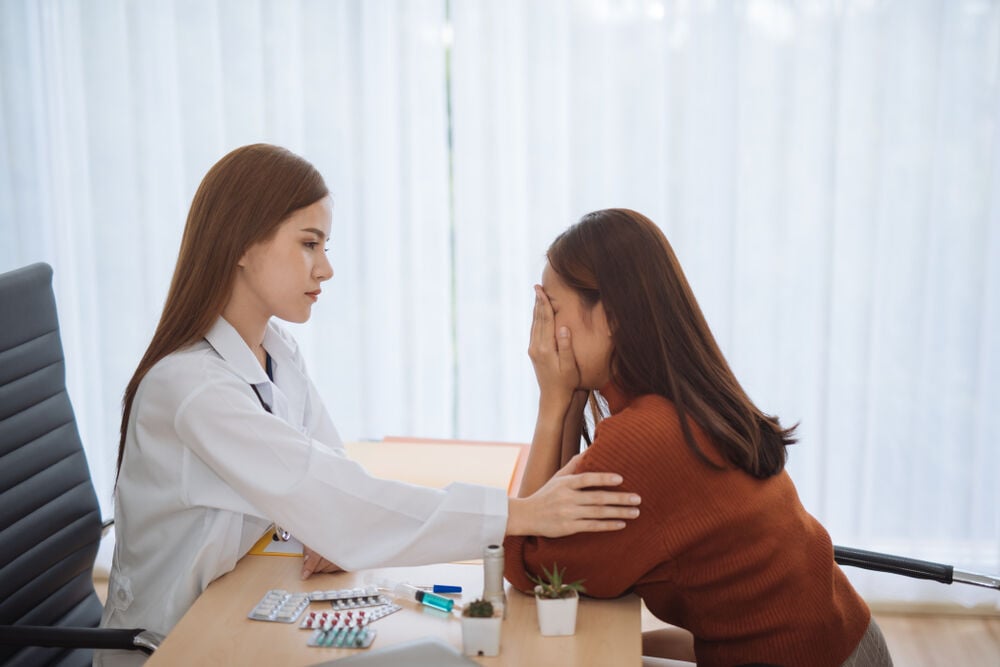Giving birth to a child is something you should be happy about and that gives you a thrilling title – mom, which makes you forget about the pains that came with it. However, there is a number of health symptoms that can't be neglected. Make sure you know them.
-
Tracking cycle
-
Getting pregnant
-
Pregnancy
-
Help Center
-
Flo for Partners
-
Anonymous Mode
-
Flo app reviews
-
Flo Premium New
-
Secret Chats New
-
Symptom Checker New
-
Your cycle
-
Health 360°
-
Getting pregnant
-
Pregnancy
-
Being a mom
-
LGBTQ+
-
Quizzes
-
Ovulation calculator
-
hCG calculator
-
Pregnancy test calculator
-
Menstrual cycle calculator
-
Period calculator
-
Implantation calculator
-
Pregnancy weeks to months calculator
-
Pregnancy due date calculator
-
IVF and FET due date calculator
-
Due date calculator by ultrasound
-
Medical Affairs
-
Science & Research
-
Pass It On Project New
-
Privacy Portal
-
Press Center
-
Flo Accuracy
-
Careers
-
Contact Us
6 Postpartum Symptoms You Shouldn't Neglect


Every piece of content at Flo Health adheres to the highest editorial standards for language, style, and medical accuracy. To learn what we do to deliver the best health and lifestyle insights to you, check out our content review principles.
Bleeding or postpartum hemorrhage
Postpartum vaginal bleeding is a common symptom both after vaginal or C-section delivery that tells you that something is wrong with you.
Naturally, a woman who had just delivered is expected to have an average blood loss of around 500 ml.
Unfortunately, this situation can grow into postpartum hemorrhage when the uterus fails to properly contract after the delivery of the placenta or due to lacerations and tears in the uterus, vagina or cervix and therefore causes heavy bleeding which might cause you to change pads frequently within one hour.
If this heavy bleeding occurs after a week or two postpartum, it might be due to the retained pieces of placenta in your uterus which was not delivered.
This also puts you at risk for postpartum hemorrhage and must not be neglected. If you’re home already and you notice this symptom, your first point of call should be your doctor. In the case of the leftover placenta, a surgical procedure might be recommended by your doctor to remove it. If you happen to be in the hospital and find yourself in this life-threatening situation, you should call the attention of a midwife or doula if your doctor is not readily available to help palpate your uterus into contraction or prescribe oxytocin synthetic hormone to be given to you, whichever be the case.
Some complications of postpartum hemorrhage might include anemia, shock or even death. Whatever happens, and you notice this heavy bleeding or postpartum bleeding clots bigger than 50p piece; do not hesitate to call the attention of your doctor as it might interest you to know that postpartum hemorrhage is the third most common cause of maternal death.
Take a quiz
Find out what you can do with our Health Assistant
Postpartum fever
Fever after childbirth is abnormal and so shouldn’t stay unnoticed. Puerperal fever can be a sign of sepsis.
Sepsis is a medical condition where infection spreads from one part of the body which is most times the point of entry of bacteria to the whole body and therefore causing very high fever. This case occurs due to poor aseptic technique used during delivery either through the vagina or while making and stitching up an incision made during cesarean delivery. Puerperal fever symptoms might include high fever of 100 degrees Fahrenheit (38 degrees Celsius) or above immediately after delivery or few days after.
This fever in most cases might be accompanied by a shivery feeling, difficulty in breathing and tachycardia with the heart rate at over 100 beats per minute. Ensure that you alert your doctor once you notice a fever after delivery that lasts for more than 48hours after you have administered recommended home remedies.
Constipation and hemorrhoids
These two symptoms are common in pregnant and postpartum women and can be as a result of the pressure the baby exerts on the lower abdominal veins. Most doctors suggest an upgrade in after pregnancy diet to foods rich in fiber, fluid, and that can initiate a better bowel movement and reduce the swelling of these veins.
Your doctor might recommend certain over-the-counter sprays and ointments and the use of a cold compress and sitz baths that can help ease your discomfort. Ensure to inform your doctor if you have to use any drugs at all especially in the case of a previous episiotomy.
Nevertheless, your diet after delivery should be one of your concerns as it would go a long way in preventing this situation.
Abdominal pain

This is totally different from your normal abdominal cramps. It is a condition often termed rare and mostly referred to as HELLP syndrome. This syndrome may develop during pregnancy and last all through your pregnancy and possibly into a week or two after delivery. Research says that HELLP can be life-threatening as it affects your liver and the ability of your blood to clot. Some of the symptoms include:
- Headache
- Severe pain in the upper part of your stomach
- A sick feeling.
The only thing you can do in this case is to inform your doctor of your situation and the symptoms you’ve observed to help him or her recommend the appropriate treatment for this syndrome.
Signs of infection
This most of the times refers to the uterine infection after. Uterine infection can be as a result of the retained placenta.
Naturally, the placenta is expelled from the vagina 20 minutes after delivery. When this happens and some pieces of the placenta are retained in the uterus, it can lead to an infection.
Signs of uterine infection after giving birth may include; a foul-smelling discharge, swollen, tender uterus, rapid increase in white blood-cell count which is abnormal. Also, an infection of the amniotic sac especially during labor can lead to infection after delivery. The incision made during a C-section can lead to uterine infection.
Signs of uterine infection after C-section may include a red pus in the area of the incision and if not handled by a trained health care personnel might result in the post C-section complications such as endomyometritis.
So if in doubt of what that pus is or the itching, alert your caregiver to recommend treatments which will leave you as happy as you were when you held that baby in your arms for the first time.
Postpartum depression
Baby blues are normal. It says that you’re anxious about the new responsibilities that comes with having a newborn or that your hormonal changes are at its best games.
But when it graduates from mere anxiety into violence, unnecessary anger and mood swings that leave you heavily depressed and lasts for a longer period of time, then the first thing that should come into your mind should be ‘Postpartum Depression (PPD)’.
Depression after birth is noticed in most women, two weeks or few months after childbirth. Signs of postpartum depression might include; intense feelings of despair, shifts in hormonal levels. Also, physical pain after childbirth, which makes it difficult for women to cope with their new ‘mom’ role is also a sign of postpartum depression. An overwhelming sense of fear, guilt, loneliness, and anger points a red finger towards PPD.
More signs include lack of interest in your baby, abnormal behavior towards your newborn or violent thoughts which might have you inflicting pain on your newborn. PPD deserves immediate attention from your doctor and so you shouldn’t sit at home and wait it out. it might be dangerous for your newborn.
Other alarming symptoms after giving birth
Other postpartum symptoms you should see as red flag signs of a disorder in your system include:
- Abnormal initial bloody vaginal discharge (Lochia)
- Severe pain during sex after delivery
- Severe headache which may suggest pre-eclampsia, i.e. pregnancy-induced hypertension.
- A tender reddened area on the breast suggesting mastitis.
- Urinary and fecal incontinence
- Clogged milk ducts which might cause your breasts to swell up or redden and become painful.
- Painful urination
- Stretch marks and so many other symptoms that cause discomfort after delivery.
Postpartum checkup

Doctors all over the world advice women to register for postnatal care after birth this is so that they can be well observed in their first 3-4 months after delivery.
This will help your doctor understand the normal way your body reacts to delivery and so any abnormalities in your system's readjustment to delivery will be spotted in time and taken care of. During this period, not only is your body monitored, but your baby is monitored too.
Therefore as a woman who has just been slammed the mom role, do not ignore your doctor's advice for a continuous postpartum check-up for a number of months after delivery. It will definitely go a long way to ensure optimum health for you and your newborn. Have a happy mom life.


Hey, I'm Anique
I started using Flo app to track my period and ovulation because we wanted to have a baby.


The Flo app helped me learn about my body and spot ovulation signs during our conception journey.


I vividly
remember the day
that we switched
Flo into
Pregnancy Mode — it was
such a special
moment.
Real stories, real results
Learn how the Flo app became an amazing cheerleader for us on our conception journey.




